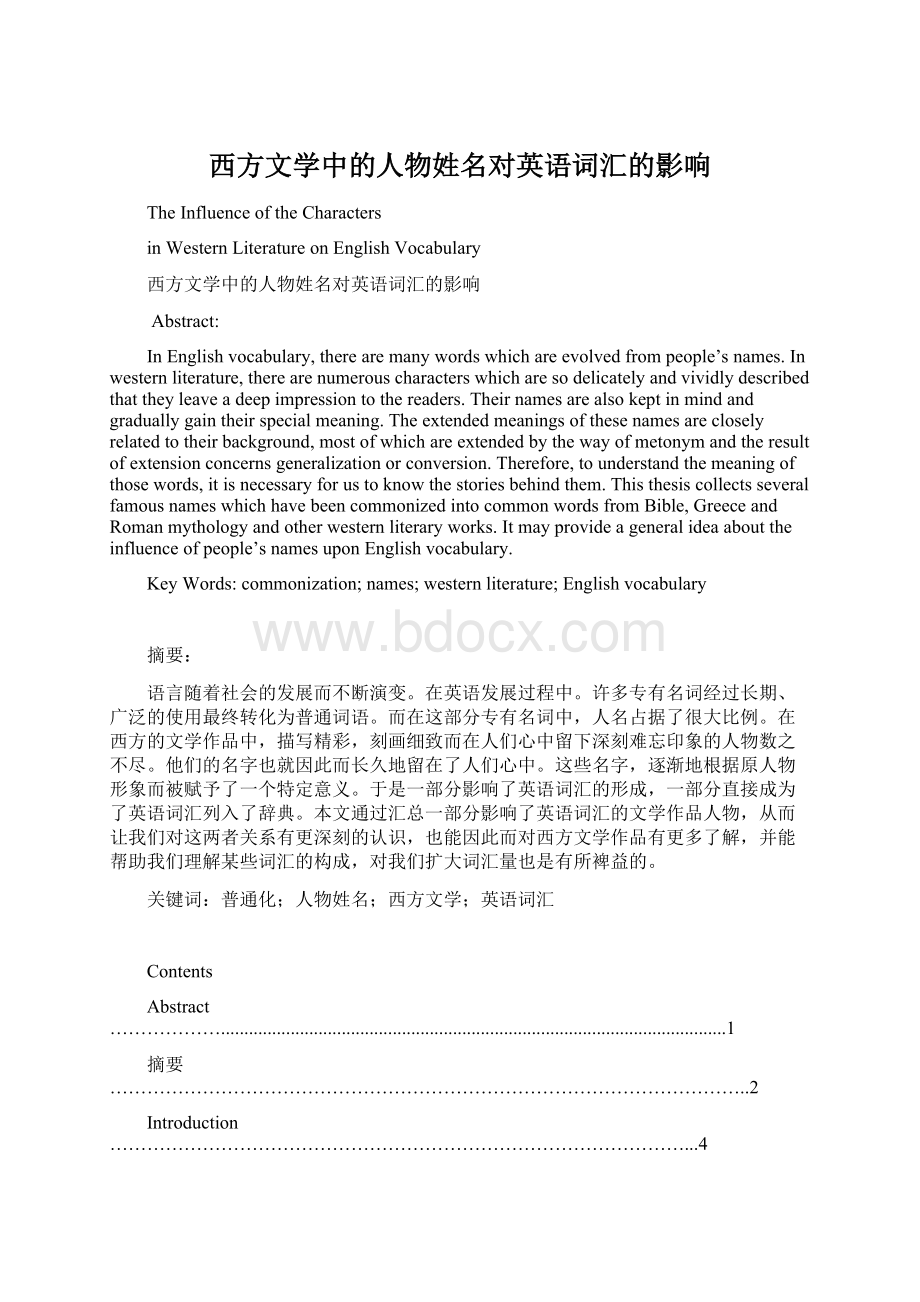西方文学中的人物姓名对英语词汇的影响Word格式文档下载.docx
《西方文学中的人物姓名对英语词汇的影响Word格式文档下载.docx》由会员分享,可在线阅读,更多相关《西方文学中的人物姓名对英语词汇的影响Word格式文档下载.docx(13页珍藏版)》请在冰豆网上搜索。

names;
westernliterature;
Englishvocabulary
摘要:
语言随着社会的发展而不断演变。
在英语发展过程中。
许多专有名词经过长期、广泛的使用最终转化为普通词语。
而在这部分专有名词中,人名占据了很大比例。
在西方的文学作品中,描写精彩,刻画细致而在人们心中留下深刻难忘印象的人物数之不尽。
他们的名字也就因此而长久地留在了人们心中。
这些名字,逐渐地根据原人物形象而被赋予了一个特定意义。
于是一部分影响了英语词汇的形成,一部分直接成为了英语词汇列入了辞典。
本文通过汇总一部分影响了英语词汇的文学作品人物,从而让我们对这两者关系有更深刻的认识,也能因此而对西方文学作品有更多了解,并能帮助我们理解某些词汇的构成,对我们扩大词汇量也是有所裨益的。
关键词:
普通化;
人物姓名;
西方文学;
英语词汇
Contents
Abstract……………….............................................................................................................1
摘要…………………………………………………………………………………………..2
Introduction…………………………………………………………………………………...4
1WhatIsAntonamasia……………………………………………………………………..….4
1.1BriefIntoroductionofAntonomasia…………………………………………………...4
1.2TwoCategoriesofAntonomasia….………………………………………………...…4
2TheProcessofCommonization………………………………………………………….….5
2.1ReasonsforCommonization……………………………………………………..……5
2.2PrinciplesofCommonization……………………………………………………….…5
3CharactersinDifferentLiteraryWorks……………………………………………….…….6
3.1Bible….......................................................................................................................…6
3.2Mythology………………………………………………………………………….…7
3.2.1GreekMythology…………………………………………………………………7
3.2.2RomanMythology………………………………………………………………10
3.3OtherWesternLiterature……………………………………………………….....…11
3.3.1BritishLiterature…………………………………………………………………11
3.3.2AmericanLiterature……………………………………………………….……..12
Conclusion……………………………………………………………………………………13
References…………………………………………………………………………………....14
Acknowledgements…………………………………………………………………………..15
Introduction
InEnglishvocabulary,itisnotdifficulttofindoutthattherearethousandsofwordswhicharerelatedtopeople’snames.Someofthesenamesarefromtherealpeopleinhistory.Somearethecharactersinliterature.Andthesenamesaregraduallyendowedwithnewmeanings.
Themeaningofthewordsoftenrelatesdirectlytotheirorigin.Allthewordscommonizedfrompropernounscanbeinterpretedintermsoftheirorigin.Therefore,tounderstandtherelationshipbetweenthecharactersinwesternliteratureandEnglishvocabularywillbenefitourEnglishlearninginseveralways.InthispapersomecharacterswhosenamesinfluencedtheEnglishvocabularywerecollectedinthehopethatitmayenableustolearnmoreaboutliteraryworks.Besides,knowingtheoriginsofsomewordscanmakeitmoreeffectivetoenlargeourEnglishvocabulary.
1.WhatIsAntonomasia
1.1BriefIntoroductionofAntonomasia
AhugenumberofwordsinEnglishvocabularycomefrompeople’snames.Basedontheorigin,thosenamescanbedividedintothreecategories,thenameofscientistsorinventors,thenameofpublicpeople,andthenameofcharactersinliterature.Asthosenamesacquiredanextendingmeaninggradually.Theyarenotonlyanameanymorebuthavebecomeoneofthewordsinourdailyuse.Thisphenomenoniswhatwecall“antonomasia”.AsanimportantpartofEnglishvocabulary,mostofthepropernounsareintheprocessofantonomasia.Itispositiveandusefultoenlargeandvisualizethevocabulary.Andinthiscasewecanalsoconsiderantonomasiaascommunization.
AccordingtoQuirketal(1985),thenamesofpeoplebelongtopropernouns.Thismeanstheydon’tneedarticle,numeralorothermodifiers.Forexample,whenwecallsomeoneweask“isitJohn”insteadof“isitaJohn”.ButonceanamebecameacommonnounsuchasShakespeare,wemaysay“heisamodernShakespeare”.AndbecauseShakespeareissofamousforhisliterarycareer,thereisnoneedtoexplainwhat“amodernShakespeare”means.
UsingthenamesofrealpeopleascommonnounsseemsmorefamiliarinEnglishvocabulary.Oneofthemainreasonsisthattheyareeasiertorecognize,suchas“Joule”and“Hertz”.However,therearemorewordswhichareevolvedfromthecharacters’namesinliteraryworks.Thecharactersandimagescreatedintheliteraryworkswereimaginary.Andtheirnameswerepropernouns.However,becauseoftheirrepresentativenessandtypification,theyfinallybecamecommonnounsusedinourcommunication.
1.2TwoCategoriesofAntonomasia
Asmentionedabove,thewordsofantonomasiahaveseveralresources.First,theymaycomefromthescientistswhodidagreatjobinsomefield,suchas“Curie”and“Newton”.Peopleusuallynametechnicaltermsintheirworkingfieldafterthescientistsinmemoryoftheircontribution.Similarly,aninventormaybememorizedfortheirinventionslikeBrailleandCondom.Thereisanoldballadwhichindicatesthissituation:
Twonobleearls,whom,ifIquote,
Somefolksmightcallmesinner;
Theoneinventedhalfacoat,
Theotherhalfadinner.
(ErnestWeekley,TheRomanceofWords,P.118)
OneofthetwoearlisSpencer(1782-1845).HewasfamousforinventingastyleofjacketwhichisnownamedasSpencer.AndtheotheroneisSandwich(1718-1792),whoseinventionisknownbyall.
Anotherkindofpeoplewhosenameisusuallyusedascommonnounisthepublicpeople.Theynotonlyleavetheirnamesinthehistorybooksbutalsoleavetheminthedictionaries.Forexample,asaleaderofAmericanindependencerevolution,JohnHancockwasthefirstpersonwhosignedtheDeclarationofIndependence.Thereforehisnamewasalwaysrelatedtosigningnames.IfyouaskanAmericantosign“JohnHancock”onapaper,he/shewillsignhis/herownnamewithoutanymisunderstanding.
ButthenamesappearinginliteraryworkstakethegreatestpercentageinAntonomasia.ThosenamesinfluencetheEnglishvocabularymost.Now,therearethousandsofhundredsofEnglishwordsareevolvedfromthenamesinBiblicalstories,Mythologyorotherwesternliteraryworks.Thiskindofantonomasiahasthelongesthistory.Anditisthemaintopicdiscussedinthisthesis.
2.TheProcessofCommonization
Howcansuchkindofcommonizationhappen?
Whatmadethosepeople’snameschangeintocommonnounsfrompropernouns?
Howdoesthisprocedurework?
2.1ReasonsforCommonization
Therearemanyreasons.Butthemostimportantreasonisbecauseofthecharacteranamerepresents.Whenaperson,whetherhe/sheisrealorfabled,isfamiliartoeverybodyenough,his/hernamewillbespokenfromtimetotime.Thisisthefirststep.Andthenpeoplemayuseittodescribetheotherpeoplewhohasthesimilarpersonalityordoesthesimilarthings.Itwillbecomeawordinourdailyuseinchbyinch.Finally,thisnameisusedsofrequentlythatpeoplewillacceptitasacommonnounanditwillberecordedinthedictionaries.Thatistosay,tomakeanameprintedinthedictionaryasacommonnoun,theownerofthisnamemustbefamousenough.He/shecanbefamousforhis/herpersonalityordeeds,buteitherofthesehastobeknownbyall.Thenhis/hernamewillbeatypicalwordtodescribesuchkindofpersonalityordeeds.Inwesternliterature,therearenumerouscharacterswhicharesodelicatelyandvividlydescribedthattheyleaveadeepimpressiontothereaders.Theirnamesarealsokeptinmindandgraduallygaintheirspecialmeaning.Therefore,someofthesenameseffectedtheEnglishwordformation.Theothersbecamecommonwordsdirectly.Butbothkindsofthenameshavesomethingincommon,whichis,theownersofthosenamesweresofamousforsomethingthattheybecametherepresentativesofsuchthings.
2.2ThePrinciplesofCommonization
Theprincipleofcommonizationistoensurethateveryonewillunderstandthemeaninganamerepresentswhenpeopleuseittodescribeotherthings.Whenwesay“HeisamodernShakespeare”,weexpectthatthelistenersknowswhat“Shakespeare”represents.Indeedtheydo.ButifthelistenershavenoideawhoShakespeareis,thissentenceismeaningless.Andthiscommonizationisfail.Sonowwecanseethatallthepeoplewhosenamehasevolvedintoawordareveryfamousone.Whenspeakingtheirnames,weallknowwhotheywereorwhattheydid.Thosearesuccessfulexamplesofcommonization.
Basically,commonizationistouseafamiliarnametodescribeanotherthing.Becausetheownerofthisnameissofamous,theimageofthispersonissoimpressive,thelistenercangetabetterviewofthedescribedthings.Propernouns,especiallypeople’snames,takeagreatproportioninEnglishlanguage.Whentheybecomecommonwords,theyareevenmoreimportant.Asaresult,itisnecessaryandusefultoknowmoreaboutthiscategoryofwords.Inthefollowingpart,sometypicalcharactersinwesternliteraturethatinfluencedtheEnglishvocabularyarecollected.Fromtheirstorywemayhaveachancetodigintotheoriginofsomewords.
3.CharactersinDifferentLiteraryWorks
Fromthebiblicaltimestomythologicaltimestillmoderntimes,thewesternliteraturehascreatednumerouscharacters.Manyofthemaresovividandclassi